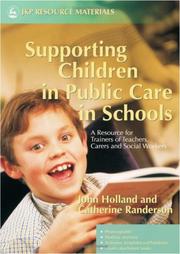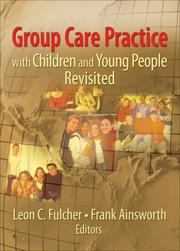| Listing 1 - 10 of 18 | << page >> |
Sort by
|
Book
ISBN: 3658056169 Year: 2014 Publisher: Wiesbaden : Springer Fachmedien Wiesbaden : Imprint: Springer VS,
Abstract | Keywords | Export | Availability | Bookmark
 Loading...
Loading...Choose an application
- Reference Manager
- EndNote
- RefWorks (Direct export to RefWorks)
In SOS-Kinderdörfern weltweit leben und arbeiten Frauen, die als Mütter für (Sozial-)Waisen sorgen. Hier bietet sich die einmalige Gelegenheit, die Verberuflichung von Mutterschaft empirisch zu untersuchen. Im Rahmen einer Feldforschung in Österreich und Bolivien analysiert Sarah Speck die Praxis dieser Einrichtungen. Das Kernstück ihrer qualitativen Studie bildet die fallrekonstruktive Auswertung von Interviews mit SOS-Kinderdorfmüttern. Des Weiteren geht die Autorin der Frage nach, was geschieht, wenn spezifische Vorstellungen von guter Mutterschaft in andere soziokulturelle Kontexte exportiert werden. Ihr Buch bewegt sich an der Schnittstelle von geschlechtertheoretischen, soziologischen und kulturanthropologischen Ansätzen und knüpft an Debatten um den Strukturwandel der Arbeit, um gegenwärtige Geschlechterverhältnisse und um kulturelle Globalisierungsprozesse an. Der Inhalt · Zur Genese eines kulturellen Deutungsmusters · Modellierte Mutterschaft · Beruf Mutter – Feldforschungen in Bolivien und Österreich Die Zielgruppen · Dozierende und Studierende der Soziologie, Kulturanthropologie und Geschlechterforschung · PraktikerInnen aus dem Bereich der Sozialen Arbeit, internationaler Hilfs- und entwicklungspolitischer Organisationen sowie Gender Consultants Die Autorin Sarah Speck ist Kulturwissenschaftlerin und wissenschaftliche Mitarbeiterin am Institut für Soziologie der Technischen Universität Darmstadt.
Cultural studies. --- Sociology. --- Social sciences. --- Cultural Studies. --- Gender Studies. --- Social Sciences, general. --- SOS Children's Villages.

ISBN: 1280349476 9786610349470 1846421462 9781846421464 9781843103257 1843103257 9781280349478 6610349479 Year: 2005 Publisher: London : Jessica Kingsley,
Abstract | Keywords | Export | Availability | Bookmark
 Loading...
Loading...Choose an application
- Reference Manager
- EndNote
- RefWorks (Direct export to RefWorks)
This is a training package designed for delivery to all professionals supporting young people who are in public care. Based on collaborative multi-agency and multi-professional work with psychologists, teachers and social workers, the training pack includes photocopiable material and instructions for more than a dozen training sessions.
Children --- Benevolent institutions --- Boys' towns --- Children's homes --- Children's villages --- Foster care, Institutional --- Homes (Institutions) --- Child care --- Child welfare --- Institutional care. --- Services for. --- Asylums --- Residential care

ISBN: 3899755677 Year: 2006 Publisher: aMünchen : Meidenbauer,
Abstract | Keywords | Export | Availability | Bookmark
 Loading...
Loading...Choose an application
- Reference Manager
- EndNote
- RefWorks (Direct export to RefWorks)
Abandoned children --- Adolescent psychology --- Personality development --- Social work with youth --- Character development --- Character formation --- Development, Character --- Development, Personality --- Formation, Character --- Adolescence --- Teenagers --- Children, Abandoned --- Exposed children --- Institutional care --- Psychology --- SOS Children's Villages. --- SOS-Kinderdorf International --- Villages internationaux d'enfants SOS --- Aldeas Infantiles-SOS --- Child psychology --- Homeless children
Book
ISBN: 1283906244 0857003895 9780857003898 9781849058124 1849058121 Year: 2010 Publisher: London ; Philadelphia : Jessica Kingsley Publishers,
Abstract | Keywords | Export | Availability | Bookmark
 Loading...
Loading...Choose an application
- Reference Manager
- EndNote
- RefWorks (Direct export to RefWorks)
How Does Foster Care Work? is an international collection of empirical studies on the outcomes of children in foster care. Drawing on research and perspectives from leading international figures in children's services across the developed world, the book provides an evidence base for programme planning, policy and practice.
Children --- Foster children. --- Foster home care. --- Child placing --- Foster care, Home --- Foster family care --- Fosterage (Foster home care) --- Fostering (Foster home care) --- Child care services --- Child welfare --- Group homes --- Foster youth --- Benevolent institutions --- Boys' towns --- Children's homes --- Children's villages --- Foster care, Institutional --- Homes (Institutions) --- Child care --- Institutional care. --- Institutional care --- Asylums --- Residential care
Book
ISBN: 0429899645 0429474873 1782413588 9781782413585 9781782201519 1782201513 9780429896947 0429913877 9780429899645 9780429474873 9781781814901 1781814902 Year: 2018 Publisher: Boca Raton, FL : Routledge, an imprint of Taylor and Francis,
Abstract | Keywords | Export | Availability | Bookmark
 Loading...
Loading...Choose an application
- Reference Manager
- EndNote
- RefWorks (Direct export to RefWorks)
This book explores the importance of effective multi-agency and multi-disciplinary partnership work for the mental health of children and young people in care and adoption. It takes an overall systemic perspective, but the co-authors contribute different theoretical approaches. It focuses on practice, showing how practitioners can draw on their varied theoretical approaches to enhance the way they work together and in partnership with carers and with professionals from other agencies. The book provides a context that looks at the needs of children and young people in the care and adoption systems, the overall importance for their mental health of joined up 'corporate parenting', and national and local approaches to this. It then moves to focus on practical ways of working therapeutically in partnership with others who contribute diverse skills and perspectives, using specific case examples. Additional chapters look at collaborative ways of working with key carers to enhance their therapeutic role. Finally, some of the main elements of partnership collaboration are explored, as well as the challenges of work across agencies and disciplines.
Adoption. --- Foster home care. --- Children --- Benevolent institutions --- Boys' towns --- Children's homes --- Children's villages --- Foster care, Institutional --- Homes (Institutions) --- Child care --- Child welfare --- Child placing --- Foster care, Home --- Foster family care --- Fosterage (Foster home care) --- Fostering (Foster home care) --- Child care services --- Group homes --- Foster home care --- Parent and child --- Institutional care. --- Asylums --- Residential care --- Institutional care

ISBN: 0203726162 1283888777 1135803722 9781135803728 0789032791 9780789032799 0789032805 9780789032805 9780203726167 9781135803797 9781135803865 113580379X Year: 2012 Publisher: New York : Routledge,
Abstract | Keywords | Export | Availability | Bookmark
 Loading...
Loading...Choose an application
- Reference Manager
- EndNote
- RefWorks (Direct export to RefWorks)
Find out how group care for children has changed in the last 20 yearsGroup Care Practice with Children and Young People Revisited focuses on the core issues that shape the quality of care that's provided in institutional and residential care settings, as well as day care services that rely on the group process. Leading authorities on residential group care practice from around the world examine practice concepts centered on three broad themes: working directly with children; working indirectly to support children and their families; and organizational influences on practice. This u
Social work with children. --- Social work with youth. --- Children --- Youth --- Young people --- Young persons --- Youngsters --- Youths --- Age groups --- Life cycle, Human --- Benevolent institutions --- Boys' towns --- Children's homes --- Children's villages --- Foster care, Institutional --- Homes (Institutions) --- Child care --- Child welfare --- Social education --- Institutional care. --- Asylums --- Residential care
Book
ISBN: 144735429X 1447354303 Year: 2021 Publisher: [S.l.] : POLICY PRESS,
Abstract | Keywords | Export | Availability | Bookmark
 Loading...
Loading...Choose an application
- Reference Manager
- EndNote
- RefWorks (Direct export to RefWorks)
EPDF and EPUB available Open Access under CC-BY-NC licence. Based on groundbreaking original research, this book provides a comprehensive account of the issues surrounding pregnancy and parenthood for young people in and leaving care. Featuring the voices of care-experienced parents, together with reflections from practitioners, it offers valuable insights into the issues facing this group. Using qualitative data to explore why parenthood is such an important issue for young people in and leaving care, this book shows what can be learned from their experiences in order to improve outcomes for parents and children in the future. The author highlights the practical and emotional needs of care-experienced parents and gives clear advice for practitioners on how these needs might be better addressed through summary points, practice guidance and recommendations for policy and practice.
Teenage parents --- Children --- Children of teenage mothers --- Services for. --- Institutional care. --- Care --- Services for --- Institutional care --- Great Britain. --- Adolescent parents --- Parents, Adolescent --- School-age parents --- Parents --- Teenage mothers --- Benevolent institutions --- Boys' towns --- Children's homes --- Children's villages --- Foster care, Institutional --- Homes (Institutions) --- Child care --- Child welfare --- Asylums --- Residential care
Book
ISBN: 1928480950 1928480942 Year: 2020 Publisher: Stellenbosch, South Africa : Sun Press,
Abstract | Keywords | Export | Availability | Bookmark
 Loading...
Loading...Choose an application
- Reference Manager
- EndNote
- RefWorks (Direct export to RefWorks)
Children --- Church work with children. --- Religious life --- Childhood --- Kids (Children) --- Pedology (Child study) --- Youngsters --- Age groups --- Families --- Life cycle, Human --- Church work with boys --- Church work with girls --- Benevolent institutions --- Boys' towns --- Children's homes --- Children's villages --- Foster care, Institutional --- Homes (Institutions) --- Child care --- Child welfare --- Asylums --- Residential care --- Institutional care.
Periodical
ISSN: 23493011 23493003 Year: 2014 Publisher: New Delhi : [California] : Udayan Care SAGE
Abstract | Keywords | Export | Availability | Bookmark
 Loading...
Loading...Choose an application
- Reference Manager
- EndNote
- RefWorks (Direct export to RefWorks)
Children --- Child care services --- Child care services. --- Benevolent institutions --- Boys' towns --- Children's homes --- Children's villages --- Foster care, Institutional --- Homes (Institutions) --- Child care --- Child welfare --- Social service --- Childhood --- Kids (Children) --- Pedology (Child study) --- Youngsters --- Age groups --- Families --- Life cycle, Human --- Institutional care --- Institutional care. --- Asylums --- Residential care --- Services for --- South Asia. --- Indian Sub-continent --- Indian Subcontinent --- Southern Asia --- Asia --- Social policy
Book
ISBN: 9060141032 Year: 1974 Publisher: Leiden Stafleu & Zoon
Abstract | Keywords | Export | Availability | Bookmark
 Loading...
Loading...Choose an application
- Reference Manager
- EndNote
- RefWorks (Direct export to RefWorks)
Educational psychology --- 343.9 --- Child psychology. --- Children --- -Childhood --- Kids (Children) --- Pedology (Child study) --- Youngsters --- Age groups --- Families --- Life cycle, Human --- Behavior, Child --- Child behavior --- Child study --- Pediatric psychology --- Psychology, Child --- Child development --- Developmental psychology --- Psychology --- Child psychiatry --- Child rearing --- Criminologie --(algemeen) --- Institutional care --- Institutional care. --- -Criminologie --(algemeen) --- 343.9 Criminologie --(algemeen) --- Child psychology --- Benevolent institutions --- Boys' towns --- Children's homes --- Children's villages --- Foster care, Institutional --- Homes (Institutions) --- Child care --- Child welfare --- Asylums --- Residential care
| Listing 1 - 10 of 18 | << page >> |
Sort by
|

 Search
Search Feedback
Feedback About UniCat
About UniCat  Help
Help News
News